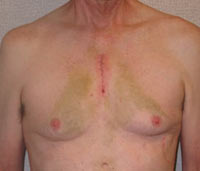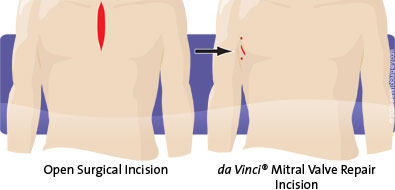“What Are The Risks Of Mini-Sternotomy Compared To A Full Sternotomy?” Asks Jenny
By Adam Pick on September 6, 2011
Jenny just sent me a very interesting question about surgical approaches for heart valve repair. She writes, “Dear Adam – I was just diagnosed with severe mitral regurgitation. I have regular degenerative mitral valve prolapse. An annuloplasty valve ring has been recommended as well. I’m thinking of having a mini-sternotomy and wondering what the risks are compared to a full sternotomy? Are there any other approaches that might be advantageous for me? Thanks, Jenny”

Mini-Sternotomy For Heart Valve Surgery
To provide Jenny with an expert opinion, I contacted Dr. Harold Roberts, a leading heart valve surgeon, from WVU Medicine in West Virginia.

Dr. Harold Roberts – Heart Valve Surgeon
So you know, during his 25+ year career, Dr. Roberts has performed over 3,500 heart valve procedures. Here is Dr. Roberts’ response to Jenny’s question:
Dear Jenny – For the properly selected patient, mitral valve repair via a minimally invasive approach is a safe, effective procedure that greatly reduces pain, infection, blood loss, recovery time as well as conferring superior cosmesis. My preferred method is the robotic endoscopic approach in which the largest incision in the right side of the chest is only 2/3’s of an inch. Patients commonly require only a 3-4 day hospitalization, and typically return to full activities within 2-3 weeks.

Cardiac maladies that are readily treated with this approach include severely leaking mitral and/or tricuspid valves, atrial fibrillation, certain cardiac tumors, and atrial and ventricular septal defects. The main requirement for using this approach instead of a traditional chest incision (sternotomy) are normal or well stented coronary arteries.
In selecting the surgeon for this type of procedure, it is important to determine his/her experience. Ask the surgeon point blank case volume and results with minimally invasive surgery. These types of procedures have difficult learning curves, and it is imperative to opt for the surgeon with years of experience in traditional and minimally invasive complex mitral valve reconstruction.
Best Regards,
Dr. Roberts
Thanks to Jenny for her question and a special thanks to Dr. Harold Roberts for sharing his clinical work and expertise with our community.
Keep on tickin!
Adam
|
Tim Purnell says on September 7th, 2011 at 1:33 pm |
|
In response to Jenny\’s question…I could not agree more with Dr. Roberts recommendation of instead having the surgery done with the robotically assisted Da Vinci method. I was told by multiple surgeons that the robotically assisted method can indeed produce a better valve repair outcome as well it clearly has many added benefits to the patient. In my own case I can certainly attest to this. I a healthy, active 34 yr old husband and father of 2. A year ago May I had robotically assisted Mitral valve repair surgery by Dr. Daniel O\’Hair in Milwaukee, WI. I am so happy with my decision! I was home from the hospital in under 48 hrs, returned back to work in 2 weeks and feel great. In addition I have very little evidence of the surgery. I have slight numbness on the right side of my chest but no pain, no meds, no restrictions and the small scars are barely noticable. Best of luck to you-please let me know if I can be of assistance to you in any way. |
 |
|
Lawrence Tillman says on September 7th, 2011 at 3:34 pm |
|
I was detected with atrial fibrillation caused by a leaking mitral valve. The valve was replaced via open surgery on July 5th and I had not experienced pain except for coughing or sneezing. In hospital 7 days and back to work half days in two and a half weeks, full day after four weeks. Everything appears normal and feeling fine for a 77 year old young man. Incision turning into a red line! |
 |
|
catherine john says on September 8th, 2011 at 3:42 am |
|
My mother has a leaking valve which we have had no explanation what the cause was there was large amount of pomblems during her operation, she is now suffering from her voice being croky at times and racing heart beat at night, she has been advice that the only way forward is a repair but she is so nervrous os having another operation. sue john (daughter) |
 |
|
Phylise Rista says on September 10th, 2011 at 10:52 am |
|
Dear Adam, Sincerely, |
 |
|
Robert says on September 22nd, 2011 at 5:46 pm |
|
For Minimal invasive heart valve surgeries, the heart surgeon’s experience seems to be vital because of the understandably complex procedures with robotics or tight openings. To be certain, we could ask our surgeons for their case volumes and results. If the surgeon is experienced we could get a full answer. If the surgeon has little or no experience, the answer could be quite veiled. This is just human nature. It would be very useful to have a national registry of all surgeons kept updated on their specialties, case volumes and results – not restricted just to heart valve surgery. Lacking such an accessible database, ex-patients’ recommendations would be the only gauge. Does anyone know if such a registry is available or is in the cards (Canada and US)? |
 |
|
Curtis Holmes says on September 25th, 2011 at 8:23 pm |
|
I have mitral stenosis, atrial fibrillation, and 70% blockage of an ITA (Mammary Artery). I am scheduled for Mitral Valve replacement surgery on Oct 17, 2011. The surgeon will also do a maze procedure to address the fibrillation and a bypass for a mammary artery. I would appreciate any feedback regarding these three procedures. Thanks Curt Holmes |
 |













